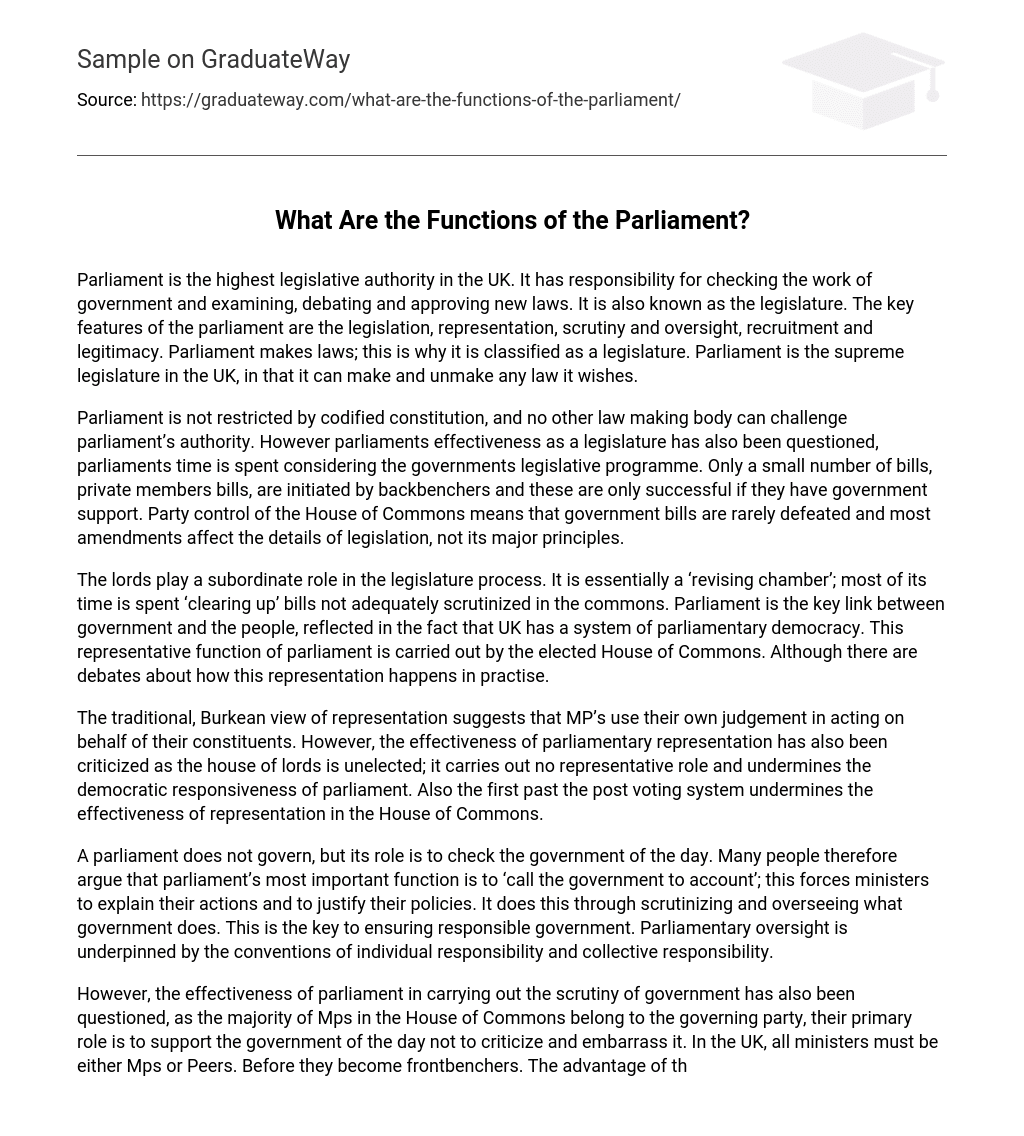Parliament is the highest legislative authority in the UK. It has responsibility for checking the work of government and examining, debating and approving new laws. It is also known as the legislature. The key features of the parliament are the legislation, representation, scrutiny and oversight, recruitment and legitimacy. Parliament makes laws; this is why it is classified as a legislature. Parliament is the supreme legislature in the UK, in that it can make and unmake any law it wishes.
Parliament is not restricted by codified constitution, and no other law making body can challenge parliament’s authority. However parliaments effectiveness as a legislature has also been questioned, parliaments time is spent considering the governments legislative programme. Only a small number of bills, private members bills, are initiated by backbenchers and these are only successful if they have government support. Party control of the House of Commons means that government bills are rarely defeated and most amendments affect the details of legislation, not its major principles.
The lords play a subordinate role in the legislature process. It is essentially a ‘revising chamber’; most of its time is spent ‘clearing up’ bills not adequately scrutinized in the commons. Parliament is the key link between government and the people, reflected in the fact that UK has a system of parliamentary democracy. This representative function of parliament is carried out by the elected House of Commons. Although there are debates about how this representation happens in practise.
The traditional, Burkean view of representation suggests that MP’s use their own judgement in acting on behalf of their constituents. However, the effectiveness of parliamentary representation has also been criticized as the house of lords is unelected; it carries out no representative role and undermines the democratic responsiveness of parliament. Also the first past the post voting system undermines the effectiveness of representation in the House of Commons.
A parliament does not govern, but its role is to check the government of the day. Many people therefore argue that parliament’s most important function is to ‘call the government to account’; this forces ministers to explain their actions and to justify their policies. It does this through scrutinizing and overseeing what government does. This is the key to ensuring responsible government. Parliamentary oversight is underpinned by the conventions of individual responsibility and collective responsibility.
However, the effectiveness of parliament in carrying out the scrutiny of government has also been questioned, as the majority of Mps in the House of Commons belong to the governing party, their primary role is to support the government of the day not to criticize and embarrass it. In the UK, all ministers must be either Mps or Peers. Before they become frontbenchers. The advantage of this is that by participating in debates, asking parliamentary questions and sitting on committees, the ministers of the future learn their political trade.
However ministers are recruited from a limited pool of talent: mainly the Mps of the largest party in the House of Commons. Parliamentarians may be speechmaking skills and learn how to deliver sound bites, but they do not gain bureaucratic or management skills to run a government department. The final functions of parliament are to promote legitimacy. When government govern through parliament, their actions are more likely to be seen as ‘rightful’ and therefore to be obeyed. This occurs for two reasons because parliament stands for the public, being representative assembly.
When it approves a measure, this makes it feel as though the public has approved it. And also parliamentary approval is based on the assumption that the government’s actions have been properly debated and scrutinized, with any weaknesses or problems being properly exposed. However parliaments legitimacy has also been criticized, respect for parliament has been undermined by scandals involving, for example the ‘cash for question’ mps being paid for asking parliamentary questions and ‘cash for peerages’.





